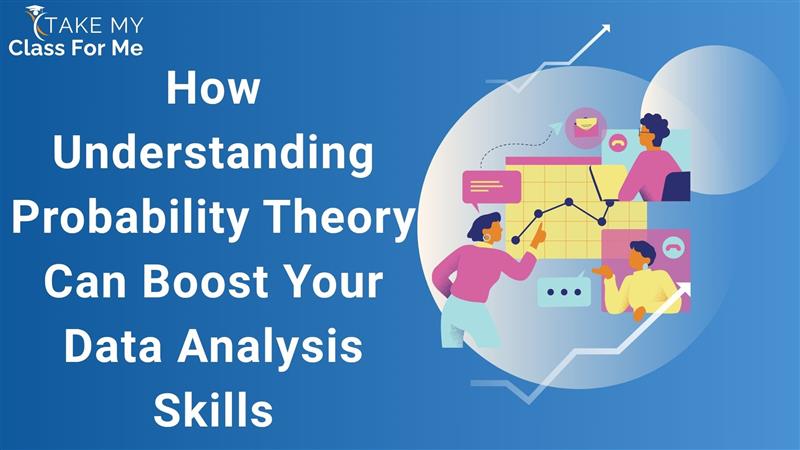Improve your data analysis skills with probability theory. By learning probability theory, you can make better business decisions. Also, it will help you predict future trends, identify patterns, and stay ahead in economics. This leads to business growth and more informed decision-making.
Probability and statistics are crucial concepts in business, economics, and management. They generally help companies make informed decisions and manage uncertainty. Specifically, probability theory allows businesses to quantify risks and make predictions about future trends. Also, it helps businesses estimate the chances of success or failure of a project. On the other hand, statistics involves collecting and analyzing data to guide decision-making. It will help businesses understand trends, manage risks, and communicate effectively. Simply by applying probability theory and statistics, companies can make data-driven decisions, correct mistakes, and achieve success. If you are pursuing business or economics courses, then to improve your data analysis skills, you must have a strong knowledge of probability theory. In this article, we have explained how understanding probability theory will help you effectively analyze data.
What is Probability?
Probability is a branch of mathematics that will help you predict what might happen in uncertain situations. It typically calculates the likelihood of different outcomes. Also, it helps to evaluate risks and make informed decisions using data and mathematical methods. Probability is useful in many fields, such as banking, research, and engineering. By understanding probability theory, you can make better decisions and predict future events more accurately.
Scope of Probability Theory in Business and Economics
Probability theory has a wide range of applications across various fields such as business, economics, science, engineering, medicine, sports, and environmental science. Mainly, with the help of probability theory, you can analyze risks, make informed decisions, and create predictive models.
Here, let us look at the significance of probability theory in business and economics.
In business and economics, probability theory is crucial for managing risks such as investment losses and loan defaults. It also helps businesses understand customer preferences and buying patterns through market research. Additionally, probability theory aids in predicting economic trends like inflation rates, GDP growth, and employment rates.
Significance of Probability in Decision Making
Probability theory will play a vital role in your life. This is because it will help you make informed decisions when you are unsure about what might happen. Specifically, with the understanding of probability theory, you can identify how likely something is to happen, so you can make a good decision. For instance, you can make smarter decisions after checking the chance of rain before planning an outdoor event, deciding where to invest your money, and understanding health risks.
These are some key concepts of probability in decision making
Probability Distributions
Probability distribution is of two types. They are normal distribution and binomial distribution. Normal distribution describes things that can be measured, like human height, test scores, and daily score returns. For example, students use normal distribution to predict their exam scores based on past results.
On the other hand, binomial distributions are used when there are only two possible outcomes. It can be either success or failure, yes or no, or win or lose. For example, job applicants use the binomial distribution to calculate their chances of getting hired after multiple interviews.
Randomness and Uncertainty
Life is full of uncertainties, such as not knowing your health results, stock market ups and downs, and unpredictable weather. With the help of probability, you can understand and deal with these uncertainties and can easily make informed decisions. Many companies also use probability to manage risks and solve problems.
How is Probability Relevant in Business and Economics?

Here, let us explore the relevance of probability theory in fields such as business and economics
Risk Evaluation
Businesses use probability to assess risks and make informed decisions. Generally, by analyzing market trends, business data, and past experiences, companies can predict their chances of success or failure.
Probability plays a key role in various business decisions, such as:
Entering new markets: Probability helps a business evaluate risks like demand, competition, and regulations before it enters a new market.
Making investment decisions: Investors use probability to assess financial risks and potential returns before investing.
Supply Chain and Inventory Management
Businesses need to manage their inventory carefully to avoid running out of stock and having too much stock. To avoid these issues, companies should aim to maintain a balance in their inventory levels. This will make sure they have enough stock to meet customer demand without overstocking.
Predicting Future Trends
Generally, probability theory will help businesses to understand market trends, predict what customers will buy, and use resources efficiently. By using probability, companies can reduce financial risks, manage inventory well, and make informed decisions. Often, demand forecasting uses probability to predict future sales by analyzing past data and industry trends.
Optimizing Resource Allocation
Probability plays a crucial role in helping businesses run smoothly and efficiently. It enables companies to allocate resources optimally, reduce costs, and boost productivity. By using probability, businesses can predict demand for products or services, plan production and manpower, manage inventory and logistics, and optimize transportation and delivery routes. For instance, manufacturers can adjust production levels based on demand forecasts, while call centers can staff accordingly to predicted call volumes. Even supermarkets and logistics firms like FedEx and Amazon use probability to avoid stock outs, predict delivery delays, and optimize their operations for faster deliveries.
Applications of Probability Theory in Data Analysis
Probability theory is crucial for data analysis as it helps interpret, model, and forecast uncertain data. It is widely used in various fields like artificial intelligence, healthcare, finance, and business to make informed decisions. It helps in summarizing data trends, evaluating investment risks and forecasting sales, predicting diseases, and improving machine learning algorithms. By applying probability, businesses can make more accurate predictions and reduce uncertainty. This, in turn, will help them make data-driven decisions and improve data analysis.
Data Visualization and Interpretation
Probability will help you understand data patterns by measuring uncertainty and identifying trends. Also, it will help you forecast, identify irregularities, and predict the likelihood of events. By applying probability theory, you can gain valuable insights from complex data. This will enable you to plan strategically and make valid decisions.
Hypothesis Testing
Businesses use probability to test ideas and confirm results, make informed decisions using data, and reduce uncertainty. A common example is A/B testing. In A/B testing, businesses compare two versions of a website, campaign, or product to see which one works better. Moreover, by applying probability theory, businesses can determine if results are due to chance or real effects and gain valuable insights to improve decision-making and planning. Overall, probability helps businesses make better decisions using data.
Predictive Analytics
Predictive analytics relies on probability to help businesses identify trends, make informed decisions, and reduce uncertainty. By analyzing past data and forecasting future results, companies can gain valuable insights to improve decision-making and planning. Probability is used in various industries, such as e-commerce, healthcare, and finance, to make accurate predictions and drive business success.
Challenges Involved in Applying Probability Theory to Business and Economics
For you, applying probability to business and economics can be challenging for several reasons. Specifically, it might be tough for you to manage large and complicated datasets. Sometimes, inaccurate or incomplete data can lead to incorrect probability estimates. Also, business trends and economic situations can change quickly to make past data less useful for forecasting.
To overcome these challenges, you can use data aggregation techniques to summarize large datasets and highlight trends. You can also choose dimensionality reduction methods to focus on the most important variables. Often, by using these techniques, businesses and economists gain valuable insights from complex data and make more informed decisions.
Wrapping Up
By now, you would have gained an understanding of how probability theory will help you analyze data in business and economics. In case you are unclear about the concepts involved in probability, send us a ‘take my math class for me’ request. We have subject experts on our team to offer you online math class help and statistics class help as per your needs. Especially with the guidance of our professionals, you can strengthen your understanding of probability theory and enhance your data analysis skills. Also, you can learn to use probability theory for analyzing data involved in business and economics.





